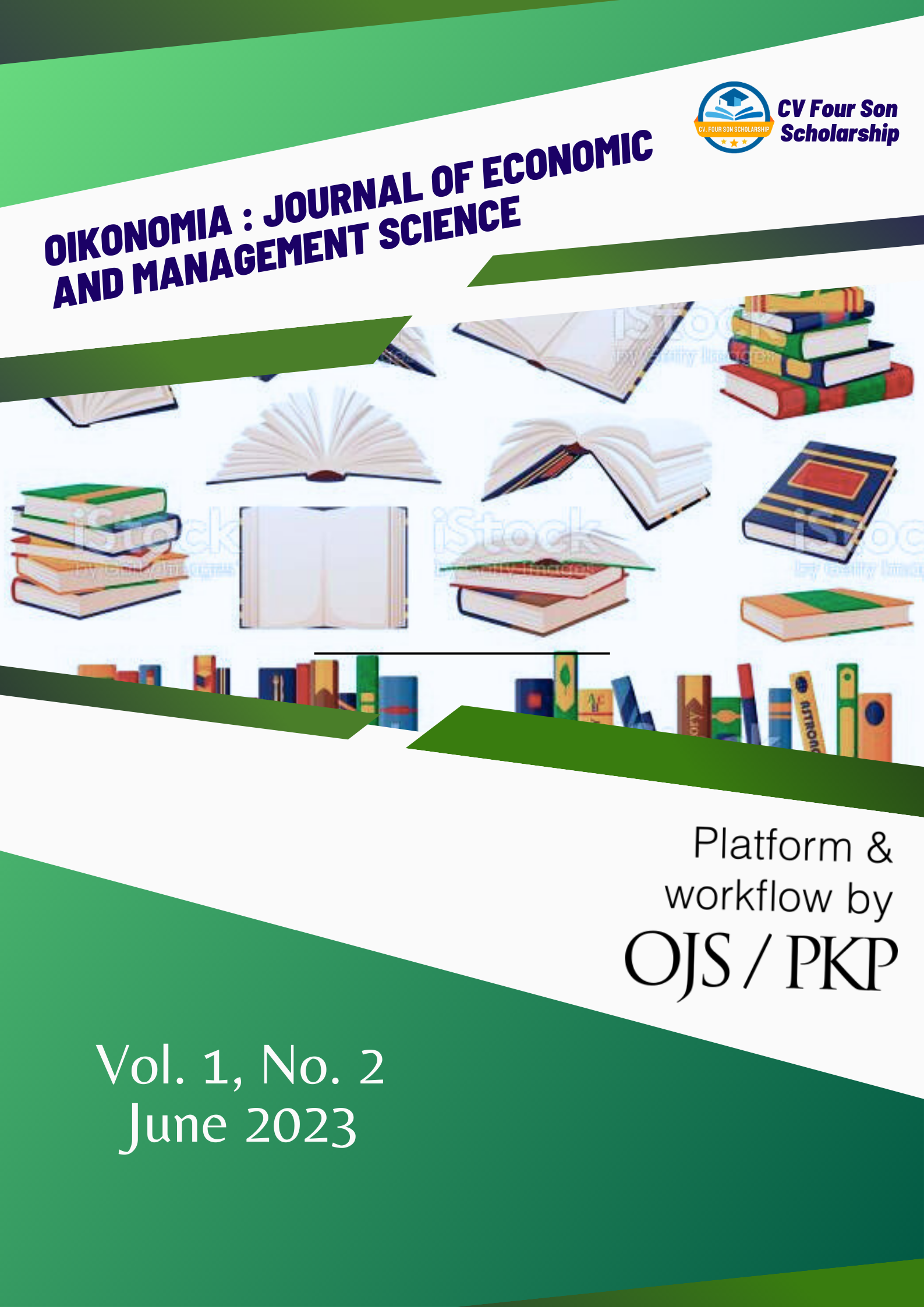THE ROLE OF HUMAN RESOURCES MANAGEMENT FOR CORPORATE SUSTAINBILITY
DOI:
https://doi.org/10.59165/oikonomia.v1i2.15Keywords:
Human Resource Management, (Profit, People, Planet), Corporate SustainabilityAbstract
As companies grow, the need for organized and effective human resource management becomes increasingly important. A company's employees are its most valuable resource, which means human resource management (HRM) plays an important role in an organization. Today, companies are becoming increasingly aware of the importance of social, ethical and ecological goals. In addition to financial returns, organizations are setting new goals for themselves, focusing on individual, communal, and environmentally friendly performance and development. In carrying out company operations, it is necessary to realize that there are social impacts that will be caused by the company. So that the responsibility that must be carried out by the company is not only to investors and creditors, but also to the company's social environment. In this case, there is a concept called the Triple Bottom Line that should be applied by every company. This article aims to conduct a literature review on the importance of human resource management in sustainable development to support companies to grow and develop sustainably.
References
Amalia, A. R., Haliah, & Nirwana. (2022). Pengukuran Kinerja Sumber Daya Manusia Dengan Pendekatan Human Resources Scorecard. Jurnal Ilmiah Akuntansi, 3(2), 28–36.
Chams, N., & García-Blandón, J. (2019). On the importance of sustainable human resource management for the adoption of sustainable development goals. Resources, Conservation and Recycling, 141(November 2017), 109–122. https://doi.org/10.1016/j.resconrec.2018.10.006
Dharma Putra, Y., Sudarma, M., & Swamardika, I. B. A. (2021). Clustering History Data Penjualan Menggunakan Algoritma K-Means. Majalah Ilmiah Teknologi Elektro, 20(2), 195. https://doi.org/10.24843/mite.2021.v20i02.p03
Fombrun, C. J. (1984). The structure of organizational governance. Human Relations. 37(3), 207–223.
Kiron, D., Kruschwitz, N., Haanaes, K., & Velken, I. von S. (2012). Sustainability Nears a Tipping Point. MIT Sloan Management Review.
Kozulj, R. (2011). Development, Poverty and Energy, in the 21st Century. Modern Economy, 02(04), 483–497. https://doi.org/10.4236/me.2011.24054
Nawawi, H. (2001). Human Resource Management for Competitive Business (4th cet.). Gadjah Mada University Press.
Nikandrou, I., & Papalexandris, N. (2007). The impact of M&A experience on strategic HRM practices and organisational effectiveness: Evidence from Greek firms. Human Resource Management Journal, 17(2), 155–177. https://doi.org/10.1111/j.1748-8583.2007.00031.x
Pfeffer, J. (2010). Building Sustainable Organizations: The Human Factor. Academy of Management Perspectives, 24(1), 34–45.
Prasetyo, I., Mansur, M., Khalikussabir, K. (2022). The Effect of Reward, Punishment and Work Motivation on Employee Productivity at PT. Juragan 99 Trans at Abdul Rahman Shaleh Malang. E-JRM: Electronic Journal of Management Research, 11(20).
Pratama, S. H., Junanto, T., Suminar, A., & Milani, I. (2023). Analysis Of Impact The Human Resource Management On Entrepreneur Organizations. 1(1).
Slaper, T. F., & Hall, T. J. (2011). The triple bottom line: What it is and how it works. Indiana business review. Indiana University.
Smith, P. A., & Sharicz, C. (2011). The shift needed for sustainability. The learning organization. 18(1), 73–86.
Telaumbanua, E. P., Rufianto, A., Junanto, T., & Suminar, A. (2023). The Effect of Implementation of Human Resource System on The Business Environment?: A Review of the Articles. 1(1).
Tsauri, S. (2013). Human Resource Management. In Journal of Modern African Studies. 35(17).
Wibisono, Y. (2007). Membedah Konsep & Aplikasi CSR (Corporate. SocialTanggung Jawab). PT Gramedia.
Wright, P. M., & Snell, S. A. (1991). Toward an integrative view of strategic human resource management. Human resource management review. 1(3), 203–225.
Yanti, F., & Rasmini, N. K. (2015). Analysis of Triple Bottom Line Disclosure and Influencing Factors: Studies in Indonesian and Singaporean Companies. E-Ournal of Accounting, Udayana University, 13(2), 4990512.







